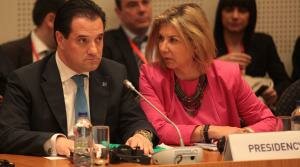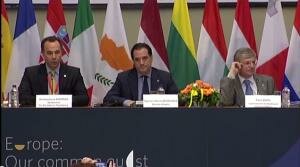- EPSCOEmployment, Social Policy, Health and Consumer Affairs Council (EPSCO)
Economic Crisis, migration and e-Health discussed at Informal Meeting of EU Health Ministers in Athens (29.4.2014)
Τhe effects of economic crisis on health and the safeguarding of health systems’ resilience, migration and its effects on healthcare, and eHealth, with an emphasis on e-Prescription and m-Health, were the focus of discussions at a two-day Informal Meeting of EU Health Ministers, chaired by Greek Health Minister Spyridon-Adonis Georgiadis, which concluded yesterday in Athens.
In his opening remarks, the Minister stressed, among other, that “as Europeans respecting human rights, we should aim at finding the way to provide health services for all citizens in the best possible way, even during the present economic crisis, which we are determined to overcome. We should always remember that the EU is the best place to live in today”.
With regard to the effects of the economic crisis on healthcare, there was wide consensus on ensuring access for all to healthcare and on further systemic improvements. It was pointed out that a new reality has been introduced by the economic environment and we should, therefore, adapt health systems accordingly. The core of this new reality consists in enhancing cooperation, exchanging best practices and information among member states in order to secure health systems’ resilience, in a number of fields including (a) the cost and pricing of pharmaceutical products, (b) the basket of basic healthcare services mainly covering most vulnerable groups, (c) investing in prevention and healthcare cost reduction, and (d) health systems performance assessment. Finally, “the deeper involvement of Health Ministers, as well as health in the framework of the European Semester, were also issues of discussion”, added Minister Georgiadis.
In relation to “Migration and Public Health”, Ministers agreed on (a) promotion of access to healthcare for all migrants; (b) the development of guidelines and methodology for the control of communicative diseases; (c) the need for special health services for particularly vulnerable migrant groups, such as pregnant women and small children; (d) the creation of a Special Working Group in the framework of the Health Security Committee to effectively address issues at hand; (e) enhanced member state cooperation for the exchange of best practices and mutual support, and (f) better information diffusion and exploitation of structural funds’ resources, including the new Fund for Asylum, Migration and Integration.
With regard to eHealth, Minister Georgiadis highlighted the interest of all Ministers, emphasizing that “eHealth solutions contribute to cost containment and better healthcare provision”.
EU Health Commissioner Tonio Borg stressed, regarding health reform in Greece, that “not any health system is sustainable unless reformed”, further adding that “the introduction of ePrescription has created one of the most advanced systems in Europe”. The Commissioner underlined, regarding migrants, “let us not treat them as a disease, but treat the diseases of migrants”, noting, in particular, the potential of the new Asylum, Migration and Integration Fund. He further thanked the Greek Minister on his support to the European Commission’s proposal for a Joint Procurement Agreement on Vaccines.










